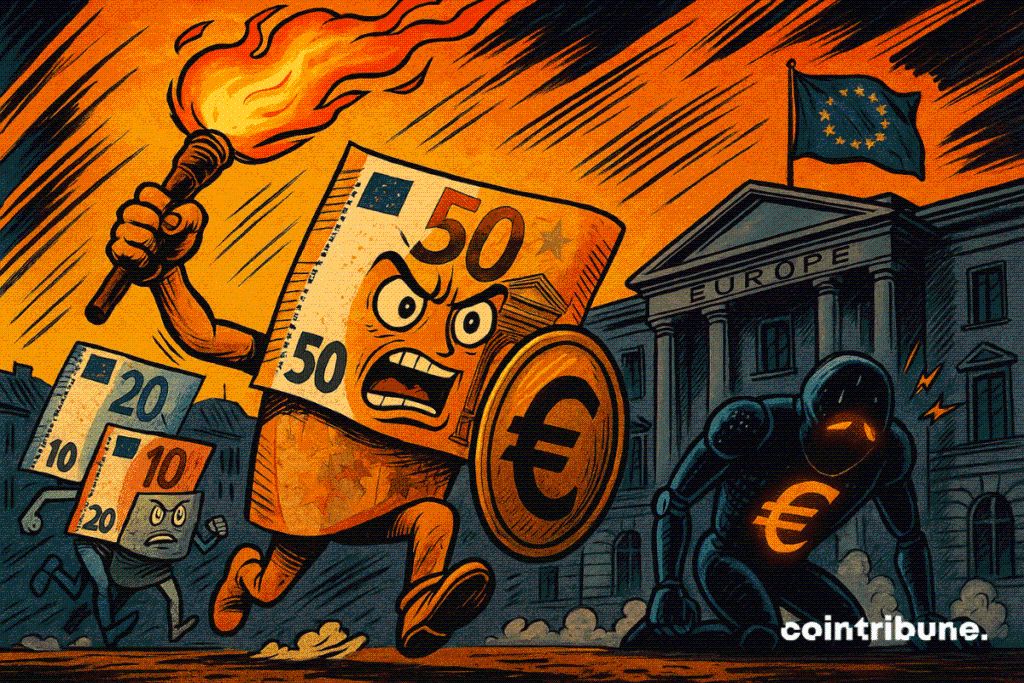ECB Reassures: The Digital Euro Won’t Replace Cash
While Europe is preparing to launch the digital euro, cash seems to be playing for time. Contrary to futuristic predictions, cash holds its ground against dematerialized payments, embodying a tenacious cross-generational and territorial attachment. Why do banknotes resist? Is it simply a delay in adoption or a revealing preference of deeper tensions within our societies? Three functions – transaction, store of value, and security – give cash a role more resilient than expected. An analysis of a resistance that says a lot about our relationship with uncertainty.

In Brief
- Cash remains the majority in 52% of in-store payments in 2024.
- Young people stock cash at home as a precaution since the pandemic.
- 62% of Europeans want to keep the option to pay in cash.
- The ECB promises coexistence between digital euro and traditional fiat currency.
Fractured Europe: when the reality of cash surpasses digital fiction
The dream of a world without cash, like in Australia , persists among some policymakers. Yet, European reality disproves them. In 2024, 52% of in-store purchases are still made in cash. A statistic that unsettles proponents of fully digitized finance.
The payment map draws a clear divide: Germany, Austria, and Switzerland maintain between 69% and 73% of payments in cash, against only 28% in Sweden. Ireland, with 59%, also stands among the faithful bastions of banknotes and coins.
In France, 51% of adults still use cash daily, a moderate decline of 5 points compared to 2023. This decline does not signal a break, but a slow erosion.
Young people, though highly connected, continue to keep cash for certain uses. Seniors, on the other hand, use it more for their everyday expenses.
This duality suggests a more complex reality: cash does not resist out of inertia, but out of necessity and preference.
The standardization of payment methods seems to clash with rooted local logics, where cash remains a reassuring landmark, almost cultural.
When uncertainty strikes, cash regains ground
In a world where everything becomes digital, cash remains a tool of trust. In 2022, holding cash at home surged, especially among 18-37 year olds. This age group, considered ultra-digital, sees cash as a fallback solution.
The ECB’s SPACE report confirms this: young people hold more cash than older generations to face the unexpected. The reason? Cash requires no network, no authorization, and remains usable in case of IT failure.
It is a bulwark against the digital divide. A weapon against banking exclusion. A tangible object in an increasingly volatile finance.
Cash is also seen as a store of value, particularly during crises. During the pandemic, its perceived importance significantly increased across all age groups.
But public policies struggle to decide. Should innovation be accelerated, or monetary resilience supported? Between technological acceleration and perceived security, cash forces a rethink of our economic fundamentals.
A hybrid finance: preserving cash without hindering the digital euro
The digital euro, the CBDC of Europe, will not signal the end of cash, say ECB officials. It will complement the existing offer. In their terms, it will be a “digital expression of cash” – a dematerialized version of fiat currency.
Yet, 62% of Europeans still say it is important to be able to pay in cash. Even in the most digitally advanced countries, this option remains crucial.
Sweden, often cited as a pioneer of cashlessness, had to revise its approach. Its government now recommends keeping at least seven days of cash expenses at home.
Europe does not want to repeat this excess. Its 2030 fiat strategy relies on a strong coexistence between cash and digital currency. The goal is to preserve universal access to cash while preparing future digital uses.
Cash and finance in 5 key figures:
- 52% of in-store payments made in cash in 2024;
- 69% to 73% cash in Germany, Austria, Switzerland;
- Only 28% in Sweden;
- 58% of Europeans worried about digital payment privacy;
- 62% want to keep the choice of cash.
This hybrid model reflects a democratic principle: finance must guarantee everyone the payment method that suits them.
If cash use declines in the long term, some analysts think bitcoin could emerge the winner . Unlike central bank digital currencies, bitcoin promises control without intermediaries, built-in scarcity, and resistance to monetary policies. A future without cash could therefore reshuffle the cards… to the benefit of the decentralized king.
Disclaimer: The content of this article solely reflects the author's opinion and does not represent the platform in any capacity. This article is not intended to serve as a reference for making investment decisions.
You may also like
BP’s Significant Write-Down Indicates Tough Times Ahead for Net-Zero Investments
Cathie Wood Is Reducing Her Palantir Holdings Once More. What’s the Best Approach to PLTR for January 2026?
GBP/AUD breaks through crucial support even as GDP beats expectations
